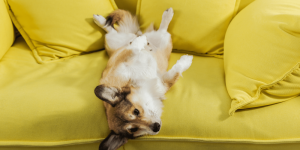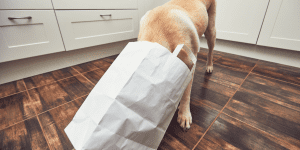Moving House with Dogs.
As most people know, moving house can be one of the biggest stressors in a person’s life. It can also impact on our pets, who often find disorder and a new environment difficult to cope with. If you are planning to move house, it’s worth putting a few plans in place, to ensure your dog stays calm and relaxed. This Holidays 4 Dogs articles will provide a few hints and tips for when you are on the move with your dog.
Moving house if often an exciting time for families, but it is also one of the most stressful. There is a great deal of organisation and planning involved with moving and this can take many weeks. People can often find the process quite stressful. However, this also can impact on our pets, who can equally find the upheaval of moving quite disorientating.
Before you move.
♦When showing prospective buyers around your home it is best to keep your dog out of the way. Not everyone likes dogs.
♦Keeping dogs can often make the house smell a little musty. A thorough clean before you show buyers
around is often a good idea – many people will be put off by doggy odours! Don’t forget to scoop any poop that may be in the garden, too.
♦While packing, make sure any hazardous materials are not left exposed. Many dogs will be tempted to investigate open boxes and bags.
♦If you are moving to a different area, register your dog with a new vet practice. It is important your pooch is registered in case accidents or emergencies occur. Many vet practices these days have a waiting list for new clients, so search around and apply well in advance.
Moving day.
♦It might be an idea to keep your dog confined to one room, especially if he is a known escape artiste. Make sure the removal men know which room the dog is in. With people coming and going and doors constantly open it would be easy to lose your dog while everyone is busy. Make sure your dog is wearing clear identification just in case.
♦Alternatively, find a friend or family member to look after your dog on moving day. It may be easier for your dog, if he can be brought to your new home in the evening, when things are calmer and more settled. This is especially so if your dog is nervous of new situations, or strange people.
♦If possible, walk your dog before the removal men arrive and packing begins – your dog is more likely to feel calm after exercise.
♦Feed your dog his normal meals but avoid giving food too near to departure time, in case of upset tummies during the journey.
Moving house with dogs – settling in.
♦Double check the garden is safe and secure. Close all doors and gates and allow your dog some much-needed freedom.
♦There will be many new smells for your dog to get used to. Some dogs may find this unsettling for a short while. If you have an non-neutered dog, watch out for any territory marking behaviour in the new house.
♦If your dog is unreliable off the lead, keep him on a lead for the first few walks in a new area. Don’t forget to update the details on your dog’s microchip and collar tag.
The majority of dogs cope perfectly well with changes in routine and new environments, but not all. Moving house can be a very stressful time for people and this can also impact on the family pet.
perfectly well with changes in routine and new environments, but not all. Moving house can be a very stressful time for people and this can also impact on the family pet.
Nervous and less confident dogs will need more attention to help them adapt to their new home more quickly.
Some dogs may take longer than others to get used to the sights, sounds and smells of their new home. This is quite often the case, if the new home needs to undergo major renovations.
While the desire to return to an old home, is not as common in dogs at it is in cats – it can happen. When you are moving house with dogs, make sure the new occupants of your previous home have your new address – just in case.
If you are not moving too far out of your original area, you may even want to consider placing your dog with one of our Holidays4Dogs approved carers for an overnight stay.



